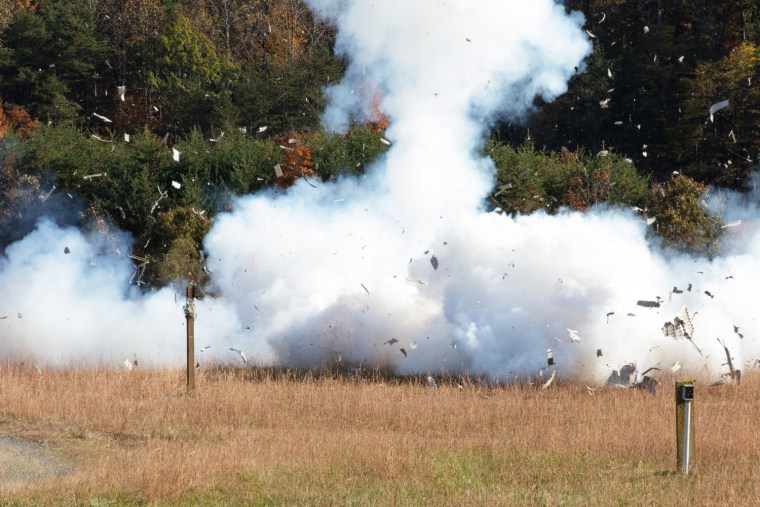Wracked by paranoia, in thrall to various conspiracy theories, Anthony Quinn Warner parked a recreational vehicle in the middle of a tourist district in Nashville, Tennessee, early on Christmas Day 2020 and set off what authorities say was the biggest vehicle bomb explosion in the U.S. in 25 years.
More than 60 buildings were damaged, including a key AT&T cellphone facility, resulting in service cuts across three states. In part because Warner broadcast a warning before the bomb went off at 1:22 a.m., he was the only person who was killed. But it was something of a wake-up call for law enforcement.
Among the alarming elements was that a lone disturbed individual was able to build, test and detonate such a large and sophisticated device using materials he bought in retail stores, much like two anti-government radicals did when they blew up a federal building in Oklahoma City in 1995.
As part of its response, the Department of Homeland Security has teamed up with the FBI to publicize Operation Flashpoint, the latest version of a long-standing effort by the government to urge local merchants to report suspicious purchases of household materials that can be used to build bombs. It comes as the Justice Department is reorganizing itself to better fight domestic terrorism.

“Right now, we have about 250,000 stores nationwide that sell products containing these explosive precursor chemicals,” Lisa Parnpichate, a supervisory special agent with the FBI’s weapons of mass destruction directorate, told NBC News. “We need them to report when they see suspicious behaviors around this. We have nefarious actors and bad people that want to buy these products specifically for the chemicals in them and then use them to make bombs to potentially harm the public.”
Bomb incidents are rising sharply in the U.S. — there were 428 in 2020, according to Justice Department statistics, up by 71 percent from the year before. And it’s happening amid heightened government concern about the rise of domestic extremism, which officials say now drives the most pressing terrorist threat to Americans' safety.
Matthew Olsen, the assistant attorney general in charge of the Justice Department’s National Security Division, told Congress on Tuesday that he was creating a domestic terrorism unit and that the number of investigations by the FBI into suspected domestic violent extremists had more than doubled since the spring of 2020.
“The threat posed by domestic terrorism is on the rise,” Olsen told the Senate Judiciary Committee. “We face an elevated threat from domestic violent extremists — that is, individuals in the United States who seek to commit violent criminal acts in furtherance of domestic social or political goals.”
Most of the bomb incidents weren’t terrorism; the list includes incidents in which thieves tried to blow open ATMs, for example. But the two explosive devices placed outside the Republican and Democratic headquarters in Washington, D.C., the night before the Jan. 6 riot — crimes as yet unsolved — were homemade pipe bombs, officials say.
“Certainly in my professional career, I think this is the highest it’s ever been,” said David Mussington, the executive assistant director for infrastructure security at DHS’ Cybersecurity and Infrastructure Security Agency, known as CISA. “These are risks to the American people and to critical infrastructure.”
Chuck Leas, who runs Operation Flashpoint for CISA, said many of the bombs are built with “products we use every day in our home.”
“They’re safe to use, but bad actors can take them and use them as not intended,” Leas said. “Different quantities, different combinations can be used to make an explosive. What we’re trying to do is, is look at the suspicious purchasing behaviors that people do in the stores and then have them reported to 1-800-Call-FBI. It’s really important to 'see something and say something.’”
The list of potential bomb ingredients is long, and it includes obvious items, such as ammonium nitrate fertilizer, kerosene and hydrogen peroxide, and less obvious ones, like flour, cinnamon and cocoa, according to government documents.
Officials say big hardware chains like Home Depot and Lowe’s understand suspicious purchasing patterns and how to report them, so they are focusing on local merchants, conducting a series of road shows around the country to raise awareness.
At the FBI’s explosives training range in Quantico, Va., analysts study the impact of various sizes of homemade bombs by building and detonating them safely.
“It doesn’t take a lot, at all, to create a bomb that’s going to hurt people, potentially,” Parnpichate said. “That’s why this is so important. ... The bomb threat is there. It’s not going away. It’s big.”
